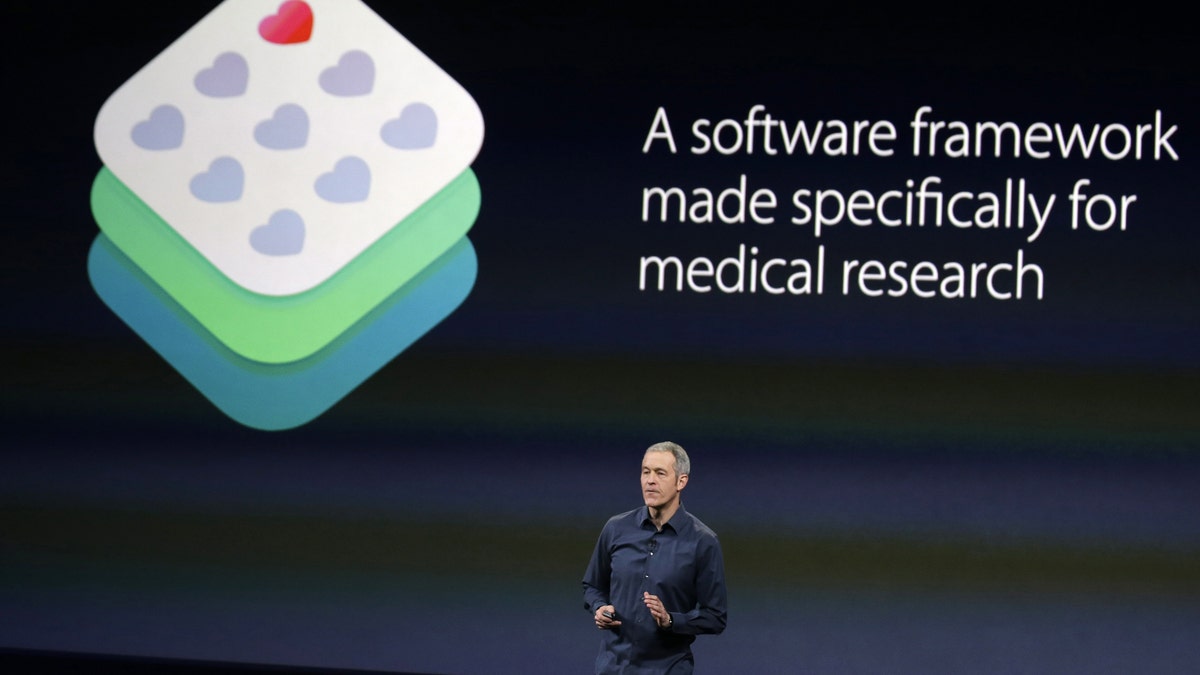
Apple Vice President of Operations, Jeff Williams, discusses ResearchKit during an Apple event on March 9, 2015, in San Francisco. (AP Photo/Eric Risberg)
Six months after unveiling an asthma research app that harnesses the power of Apple’s iPhone, experts at the Icahn School of Medicine at Mount Sinai in New York are thrilled with the study's early results.
“We are delighted with the initial results we’ve seen after six months of using Apple’s ResearchKit framework for our Asthma Health app,” said Eric Schadt, professor of genomics at the Icahn School of Medicine, in a press release. “We recruited and enrolled over 8,600 research participants in our study, remotely via the Asthma Health app without direct, in-person, contact.”
Related: Asthma Health app harnesses the power of Apple’s iPhone
Jointly developed with LifeMap Solutions, the app uses Apple’s ResearchKit open source software framework, and aims to make it easy for asthma sufferers to participate in research studies via their iPhones.
The Asthma Health App also taps into Apple’s Health Kit, a tool for developers that lets health and fitness apps work together. When granted permission by the user, the Asthma Health app accesses data from Health Kit to track, for example, asthma inhaler use measured by third-party devices and apps. It can also take advantage of the iPhone’s features such as GPS sensors to gather other relevant health data.
The app broke the geographic barrier that typically limits traditional research to the local area of a university or medical center, according to a spokesman for the Icahn School of Medicine. “For our study, 87 percent of participants live outside of NY and NJ,” he told FoxNews.com, in an email.
Related: Apple unveils iPad Pro, new iPhones, revamps Apple TV
Participants using the app on a regular basis also reported improved exercise capabilities via surveys, according to the spokesman, noting a statistically significant increase in step count (as measured by Apple HealthKit).
The app, one of a number of medical research apps unveiled during Apple's “Spring Forward” event earlier this year, can pull in data from wearable fitness devices, while also providing the user with information on pollution and pollen levels.
Researchers recruited more severe asthmatics than would typically take part in a traditional research study. “Patients with more severe, less controlled asthma symptoms appear to be more engaged and use our app more frequently,” said the spokesman. “We hypothesize that these more severe sufferers are more motivated to contribute to medical research, and also have personally experienced the benefits of using the app as a 'reminder' for medication and self-monitoring of triggers and local air quality.”
Related: iRing? Apple publishes a patent for a smart ring that controls your touchscreen
New features of the app were unveiled this week. These include a “doctor dashboard” that lets participants share their asthma data with care providers and the ability to link app data to Epic, the electronic health record system used at Mount Sinai and a number of other medical centers.
Data privacy, however, is of critical importance. Earlier this year Schadt told FoxNews.com that users’ research data are encrypted and held in secure cloud-based storage, meeting industry standards and are compliant with the Health Insurance Portability and Accountability Act (HIPAA).
The genomics professor also reiterated the privacy message delivered by Apple during its launch event. “Apple doesn’t touch the data – they have no access to the data,” he said.
Follow James Rogers on Twitter @jamesjrogers
